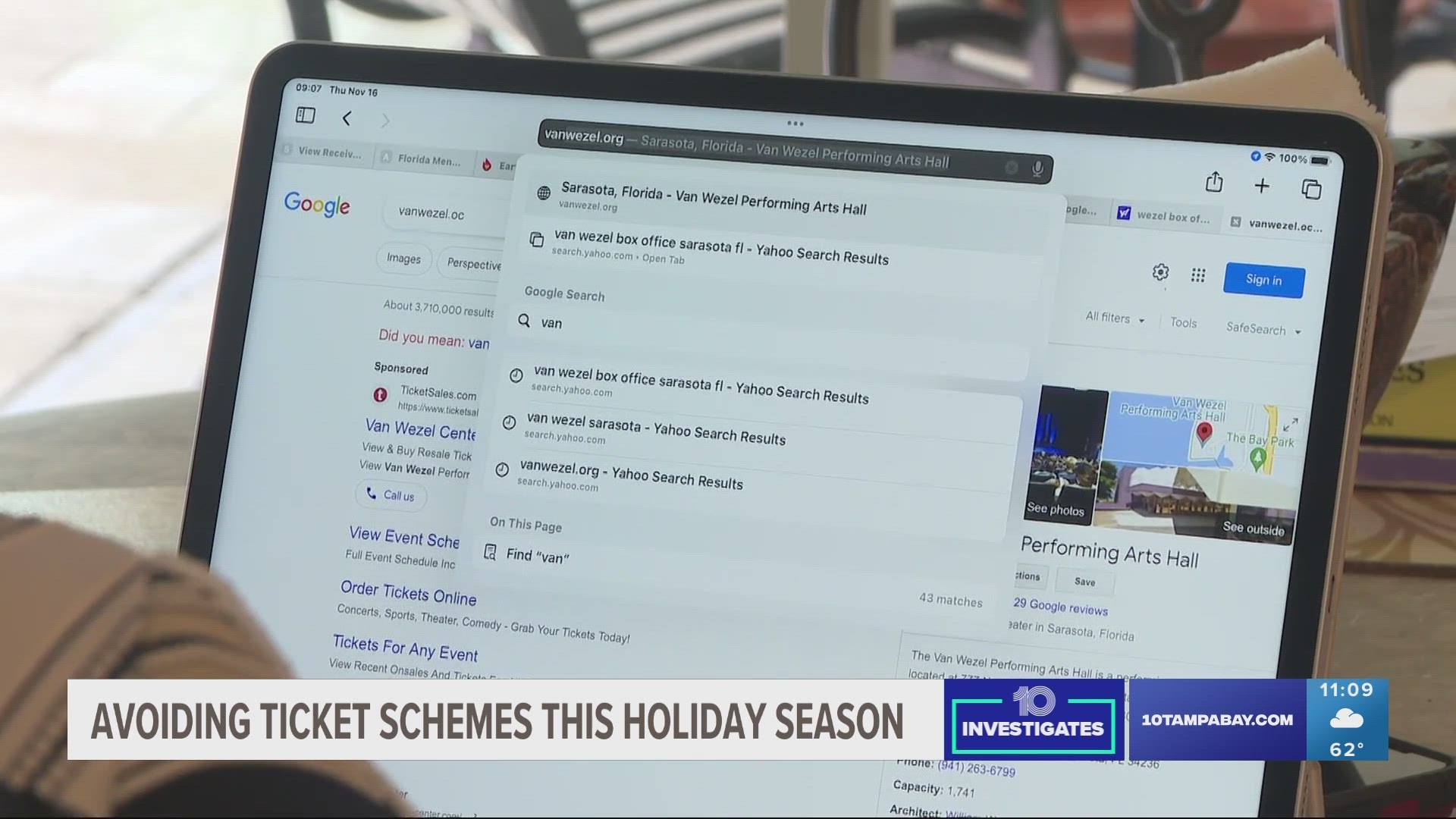SARASOTA, Fla. — Donna Henry was looking for tickets to an upcoming show at the Van Wezel. It was the Fleetwoods, her husband's favorite group. She figured they’d also invite four friends. So she went online to order four tickets. She was not ready for what came next.
“I went ahead and bought four tickets and I saw another show I wanted to see. So, it was a total of 6 tickets. I bought those and closed out of the window. Then the actual Van Wezel site popped up and that’s when I realized I had just been at a site that did not represent the theater,” said Henry.
Henry was on a third-party site.
“The tickets were triple the price. The handling fee was $50 a ticket,” said Henry.
Third party sites are popping up more and more. They can look almost identical to the ticket site you think you are buying from, but instead of '.org', the site's URL may end with a '.com', or there may be an extra dash. All things that, according to the Better Business Bureau, you need to pay more attention to.
“When people are doing searches online, any company can advertise to show up on top of results and it’s not the company you are searching for,” said Bryan Oglesby with the Better Business Bureau. “Don’t just click and buy the first thing you see. Find that verified resale site. Do your research. You can check out that site’s history on bbb.org.”
Donna says she didn’t get her money back after working to dispute the charge with her credit card company, because the tickets weren’t a scam. They were just more than she wanted to pay.
“I’m stuck with this charge, and I have to be OK with that,” said Henry.
But she says her experience can help others this holiday season, to double check before they click the 'buy' button.
Here are some Better Business Bureau tips for buying tickets, whether you are looking for tickets for a game, concert tickets, or any other event:
- Purchase from the venue whenever possible. Many official ticket sales agents now offer secondary sales options, as well.
- Consider your source. Know the difference between a professional ticket broker (a legitimate and accredited reseller), a ticket scalper (an unregulated and unlicensed ticket seller), and a scammer selling scam tickets.
- Check out the seller/broker. Look them up on BBB.org to learn what other customers have experienced. Check to see if they are a member of the National Association of Ticket Brokers. NATB members offer a 200% purchase guarantee on tickets. Look up the seller on VerifiedTicketSource.com to confirm you are buying from a NATB-member resale company.
- Buy only from trusted vendors. Buy online only from vendors you know and trust. Look for the lock symbol in the web address to indicate a secure purchasing system. Don’t click through from emails or online ads; a common ticket scam trick is to create a web address that is similar to a well-known company.
- Know the refund policy. You should only purchase tickets from a ticket reseller that provides clear details about the terms of the transaction. Sellers should disclose to the purchaser, before purchase, the location of the seats represented by the tickets, either orally or by reference to a seating chart; and, if the tickets are not available for immediate access to the purchaser, disclose when the tickets will ship or be available for pick up.
- Use payment methods that come with protection. Always use a credit card, so you have some recourse if the tickets are not as promised. Debit cards, wire transfers, or cash transactions are risky; if the tickets are fraudulent, you won’t be able to get your money back.
- Be wary of advertisements. When you search the web for online tickets, advertisements for cheap tickets will often appear. Use good judgment; some of these ads will be ticket scams, especially if the prices are low.
- If you’re unsure, verify your tickets. Pay a visit to the arena where the event will be held. Present your ticket to “Will Call” (customer service), and they can verify if your ticket is legitimate and show you how to tell if it is fake.

